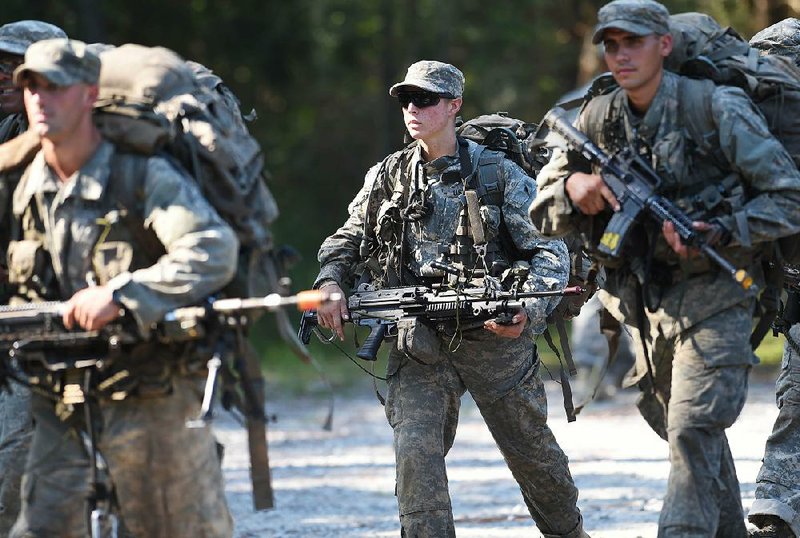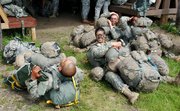WASHINGTON -- Two women have passed the Army's Ranger School, becoming the first women to complete the grueling combat training program and earn the right to wear Ranger tabs on their uniforms.
The Army's Ranger headquarters in Fort Benning, Ga., said Kristen Griest, a military police officer from Orange, Conn., and Shaye Haver, an Apache helicopter pilot from Copperas Cove, Texas, and 94 men passed the 62-day course that tests their ability to overcome fatigue, hunger and stress during combat operations. They were among 401 soldiers who started Ranger School on April 19.
Only about 3 percent of active-duty soldiers in the Army have earned their Ranger tabs.
While completing the leadership course lets the two women wear the coveted Ranger black-and-gold tab, it does not let them become members of the Ranger regiment.
Allowing women to participate in the Ranger course is part of the U.S. military's push to open more combat jobs to women. But the toughest jobs remain closed to female soldiers -- including infantry, armor and special operations positions. That includes the 75th Ranger Regiment, which requires additional schooling that is physically and mentally challenging before soldiers can join.
Today about 220,000 positions are open only to men. Virtually all are in the Army and Marine Corps, including infantry and armor units that fight on the front lines.
Former Army officers such as Sue Fulton, who in 1980 was among the first women to graduate from West Point, celebrated the news as another milestone toward ending gender barriers in the military.
"This answers whatever questions may still remain about whether women have the strength, the will and the physical courage to become combat leaders," said Fulton, a former Army captain who now is chairman of the West Point board of visitors, an advisory panel of presidential appointees and members of Congress.
A graduation ceremony will be held Friday at Fort Benning, the U.S. Army post near the Georgia-Alabama line.
"Each Ranger School graduate has shown the physical and mental toughness to successfully lead organizations at any level," Army Secretary John McHugh said in a statement.
"This course has proven that every soldier, regardless of gender, can achieve his or her full potential.
"We owe soldiers the opportunity to serve successfully in any position where they are qualified and capable."
The 62-day school includes three phases, each in a different part of the country: wooded areas of Fort Benning, the Appalachian mountains of north Georgia and swamps in Florida.
The first 20 days of Ranger School focus on military skills and endurance. Then the mountain phase near Dahlonega, Ga., includes more small-unit operations and survival techniques. The Florida swamp phase includes airborne assault, amphibious operations, and extreme mental and physical stress.
Female soldiers were held to the same physical standards as men. That included passing a fitness test of 49 push-ups, 59 sit-ups, six chin-ups and finishing a 5-mile run in 40 minutes.
Graduates also had to perform a 12-mile foot march in three hours, complete three parachute jumps and four air assaults on helicopters, as well as endure 27 days of mock combat patrols.
The two women had to repeat some tasks and phases, and they have taken longer to make it to graduation than most students who make it through Ranger School. But Army officers said it is not uncommon for male students to have to redo as many portions of the course as the women have.
Policy shift
In 2013, the Pentagon announced it would lift its formal ban on women in combat, and the Army and other services have until Jan. 1 to decide which jobs they still want to keep off-limits to women. They must provide a rationale for each position they want to keep restricted.
The Army, Navy and Air Force are not expected to seek any exceptions to keep women out of combat jobs, The Associated Press reported Tuesday, citing officials who are aware of preliminary talks in the Pentagon. Only the Marine Corps appears poised to resist the sweeping changes to gender roles, particularly in its infantry where there is resentment for the idea from some leaders.
Defense Secretary Ashton Carter, a civilian who never served in the military, is expected to rule on each request by January with guidance and feedback from senior military officials. Marine Gen. Joseph Dunford, a Ranger School graduate and veteran infantryman, also is expected to have a leading role after taking over as the new chairman of the Joint Chiefs in October.
The policy shift reflected a reality that has been obvious to hundreds of thousands of soldiers, Marines and other service members who deployed to Iraq and Afghanistan: Women have for years played increasingly significant roles in combat. They have fought insurgents in dangerous areas as top-gunners in Humvees and door-gunners on helicopters.
They have served on female engagement teams with the Marines, and in cultural support teams that accompany Rangers, Navy SEALs and other special operators on raids.
Some women even perform intelligence gathering as part of SEAL Team 6's top-secret Black Squadron.
Reactions varied as news of the women's accomplishments spread.
David Perry, a retired major now living in South Carolina, earned his Ranger tab in 1997 and was a Ranger instructor at Fort Benning in 2000.
"Bottom line, this is great news for our Army," he said. "The ability to be a great military leader is not and never has been gender specific. We just got more good combat leaders."
But Retired Lt. Col. Don Bowman, a Columbus, Ohio, certified public accountant who is in the Ranger Hall of Fame, called the situation silly and questioned the financial cost to the Army.
"This is social engineering and political correctness run amok," said Bowman, 80. "I do not say the contribution of women to our armed forces is not valuable. Their work is highly prized and they bring insights and talent to the Army that are of incalculable value."
Information for this article was contributed by staff members of The Associated Press; by Richard A. Oppel Jr. and Helene Cooper of The New York Times; by Chuck Williams and James Rosen of Tribune Wire Services; and by Dan Lamothe of The Washington Post.
A Section on 08/19/2015


